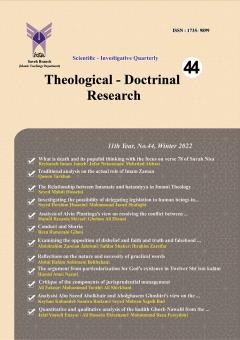The Relationship between Imamate and Khatamiyya in Imami Theology
Subject Areas : کلام اسلامی
1 -
Keywords:
Abstract :
One of the fundamental issues in Shiite beliefs is the relationship between Imamate and Khatamiyya; according to the Shiite view, not only is there no incompatibility between Imamate and Khatamiyya, but there is also a connection. The position of Imamate is alongside the position of prophethood, and the purpose of Khatamiyya will not be fulfilled except by Imamate. However, some Sunni scholars and religious intellectuals have criticized this connection. In this study, based on reliable and scholarly documents and with the help of the principle of Khatamiyya, we try to examine, evaluate and criticize the most important doubts raised about the affairs of the Infallible Imam in Shiite theology; including the Imam's relationship with the unseen world, legislative guardianship, the authority of the word and the religious authority of the Imams. The criterion of prophecy is "receiving direct revelation from God" and "independent authority"; this is while the Shiites, on the one hand, consider their Imams to have authority based on the Prophet and through him, and on the other hand, they believe the acquisition of truths by the Imam indirectly through the legacy of the Prophet. By explaining the ambiguities and answering them, it becomes clear that the Shiite approach in interpreting the principle of Khatamiyya, which is reflected in the holy Qur'an, the Prophetic tradition and common sense, is the only approach that justifies Khatamiyya and causes the continuation of the divine mission and guardianship.
قرآن کریم.
نهج البلاغه.
آمدی، سیف الدین، غایه المرام فی علم الکلام، المجلس الأعلی لشؤون الاسلامیه، القاهره، ۱۳۹۱ه ق.
ابن قلانسی حمزة بن اسد، تاریخ دمشق، چاپ دارالفکر، بیروت، لبنان، 1414 ه ق.
ابن ابی الحدید ، شرح نهجالبلاغه، دارالاحیاء التراث العربی، بیروت، 1412 ه ش
الطحاوی، ابیجعفر، مشکل الآثار، چاپ دارالکتب العلمیه بیروت، 1410.
ایجی، قاضی عضدالدین، المواقف، فی علم الکلام، دارالقلم، بیروت، 1978 م.
بحرانی، میثم ابن میثم، قواعدالمرام فی علم الکلام، منشورات المرعشي، قم، 1406 ه ق.
تفتازانی، سعدالدین، شرح المقاصد، منشورات الرضي، قم، 1370 ه ش.
حاکم حسکانی، ابوعبیداللهبن احمد، شواهد التنزیل، مؤسسه اهلبیت(ع)، قم،1427 ه ق.
حلی، حسن بن یوسف ، الألفين، انتشارات هجرت، قم.
حرّ عاملي، محمد بن حسن، وسائل الشيعه، داراحياء التراث العربي، بيروت، 1414 ه ق.
رضی، سیدشریف، نهجالبلاغه، ترجمه و شرح فیض الاسلام، تهران، 1351 ش.
سبحانی، جعفر، العقیده الاسلامیه، موسسه امام صادق(ع)، قم،1387 ه ش
سبحانی، جعفر، خاتمیت، انقطاع وحی تشریعی: پاسخ ایت الله سبحانی به دکتر سروش، معارف، شماره 31، 1384.
سروش، عبدالکریم ، بسط تجربه نبوی، تهران، نشرصراط، 1385 ه.ش.
سروش، عبدالکریم، فربه تر از ایدئولوژی، نشرصراط، 1375 ه.ش.
صدوق، محمدبن علی، معانی الاخبار، نشر دارالکتب الاسلامیه، قم، ۱۳۷۲ ه. ش.
صدوق، محمدبن علی، عيون اخبار الرضا، دارالکتب الاسلاميه، 1412 ه ق.
الصفّار، حسن بن مرّوج، بصائر الدرجات الکبری فی فضائل آل محمد(ص)، مؤسسه الاعلمی، تهران، 1374 ش.
علم الهدی، سید مرتضی، الذخیره فی علم الکلام، مؤسسه النشر الاسلامي، قم المقدسه، 1411 ه ق.
رفاعی،عبدالجبار، معجم ما کتب عن الرسول و اهل بیته، وزارت ارشاد، 1371 ه.ش
رازی، محمدبن عبدالقادر، مختارالصحاح، مكتبه لبنان، 1992م.
صدر، سید محمد باقر، بحوث فی علم الاصول، ص 30، مؤسسه دایرة المعارف فقه اسلامی، 1417 هـ ق.
طباطبایی، سید محمد حسین، حاشیة الکفایة، ص 97، بنیاد علمی فکری علامه طباطبایی
طوسی، خواجه نصیر الدین، قواعد العقائد، دارالصفوه، بیروت،1372 ه.ش.
طوسي، نصيرالدين، تجرید الاعتقاد، مکتب الاعلام الاسلامی،
فراهیدی، خلیل بن احمد، کتاب العین، انتشارات هجرت،قم،1409 ه ق.
کلینی، محمد بن یعقوب، کافي، دار الکتب الاسلاميه، تهران، بيتا.
مفيد، محمد بن محمد بن نعمان، امالي، كنگره شيخ مفيد، 1314 ه.ق
مفيد، محمد بن محمد،اوائل المقالات، تبريز، چاپ سوم، 1371 ه.ش.
مکارم شيرازي، ناصر، تفسير نمونه، دارالکتب الاسلاميه، تهران، 1382 ه ش.
موسوی همدانی، سید محمد باقر، ترجمه الميزان، مؤسسة الاعلمي، بيروت، 1393 ه ق.

